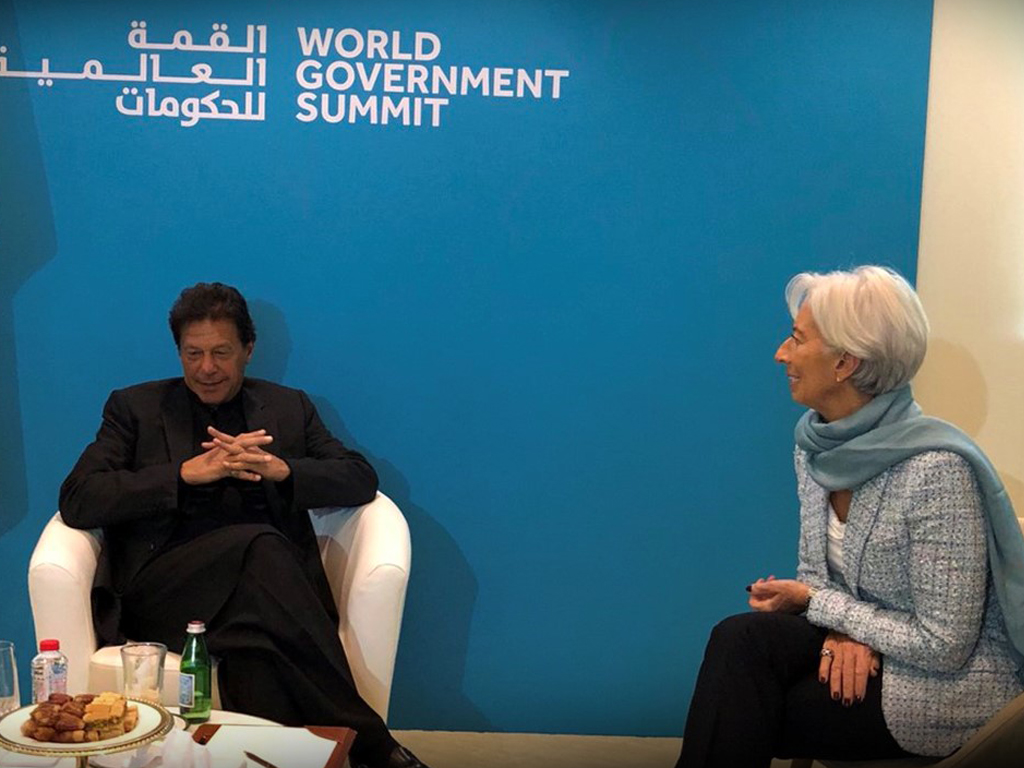PM-IMF chief meeting


The tenor of Prime Minister Imran Khan's meeting with International Monetary Fund (IMF) Managing Director (MD) Christine Lagarde on the sidelines of the 7th edition of World Government Summit held in Dubai is markedly different between the Prime Minister's tweet/press release from the state-owned news agency, and the MD's statement uploaded on the Fund's website. The Prime Minister tweeted that "there was a convergence of our views on the need to carry out deep structural reforms to put the country on the path of sustainable development in which the most vulnerable segments of society are protected;" and the state-owned news agency reported that the MD acknowledged the steps taken so far by the Pakistan government for stabilising the economy," implying that the finance amendment bill one and the yet to be passed finance amendment bill two, the considerable increase in utility rates and the depreciation of the rupee to date met with IMF's approval.
Following the meeting, Lagarde made a statement as per the IMF website during which she "reiterated that the IMF stands ready to support Pakistan. I also highlighted that decisive policies and a strong package of economic reforms would enable Pakistan to restore the resilience of its economy and lay the foundations for stronger and more inclusive growth. As emphasized in the new government's policy agenda, protecting the poor and strengthening governance are key priorities to improve people's living standards in a sustainable manner." The Fund's support would be contingent on the Pakistan authorities agreeing to standard normal IMF conditions which include "a strong package of economic reforms" that given previous IMF bailout packages would include: (i) governance reforms would be supported, however till such a time as governance improves, the Fund is likely to insist on raising utility rates even higher than what has already been done by the Khan administration, with obvious negative political repercussions; (ii) raising revenue (the envisaged rise in the first finance amendment bill was unrealistic and Federal Board of Revenue has indicated its inability to achieve the target), as well as reducing expenditure (with the second amendment finance bill expected to raise expenditure by about 6.8 billion rupees as per the government with independent economists giving the cost at 140 billion rupees); (iii) state-owned entities, including Pakistan Railways, guzzling over 1.3 trillion rupees each year need to be restructured/privatised within a time-bound action plan as a structural benchmark; (iv) in spite of over 35 percent rupee depreciation during this fiscal year, the rupee value as per the Fund continues to be propped up by market interventions which need to be removed; and (v) it is important to keep Lagarde's statement during the second week of October 2018 in mind when she was asked about Pakistan debt to China, "in whatever work we do, we need to have a complete understanding and absolute transparency about the nature, size, and terms of the debt that is bearing on a particular country." Needless to add, the IMF would also seek details of our loans from Saudi Arabia and the United Arab Emirates.
Lagarde supported the government's key policy to protect the poor but added that this should be implemented to ensure sustainability. In this context, it is relevant to note that the IMF fully supported the Benazir Income Support Programme (BISP) during the previous two bailout packages to Pakistan (2008 and 2013) and Lagarde's statement does not reflect a change from that position.
The Fund does not adjust the harshness of its bailout package conditions on how much assistance is sought but on the state of the economy. The Prime Minister has consistently accused the previous administration of leaving the economy in shambles, an opinion that no one but members of the previous administration would contest. His strategy has been to procure loans from friendly countries however as Business Recorder has consistently maintained any delay in going to the IMF for a bailout package would simply compound the harshness of the conditions instead of easing them because the structural imbalances would worsen particularly the budget deficit and foreign exchange reserves which have fallen to less than nine billion dollars - not enough to cover three months of imports.






















Comments
Comments are closed.